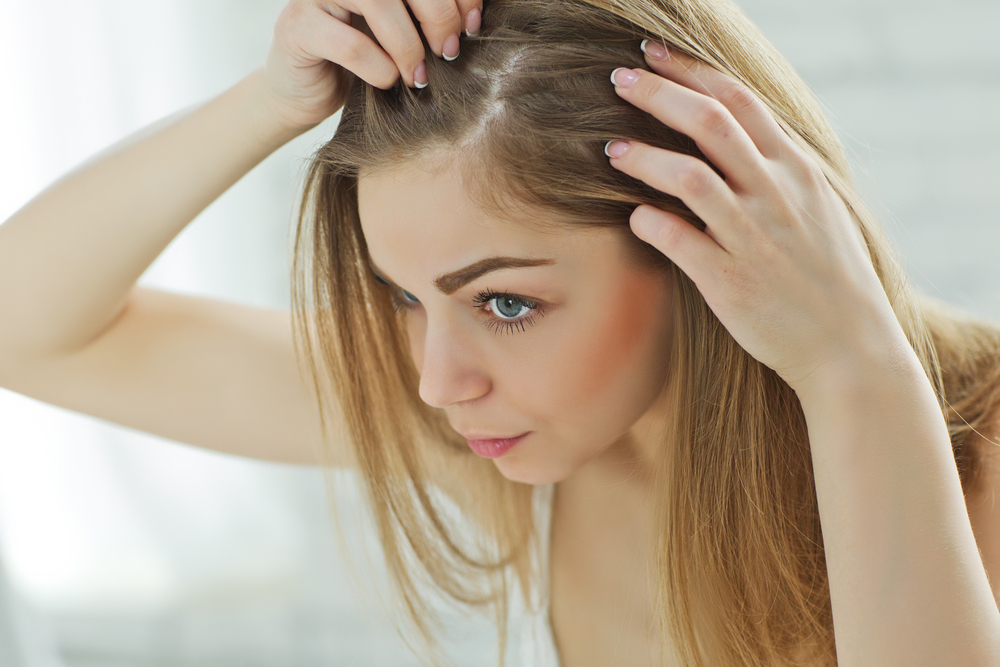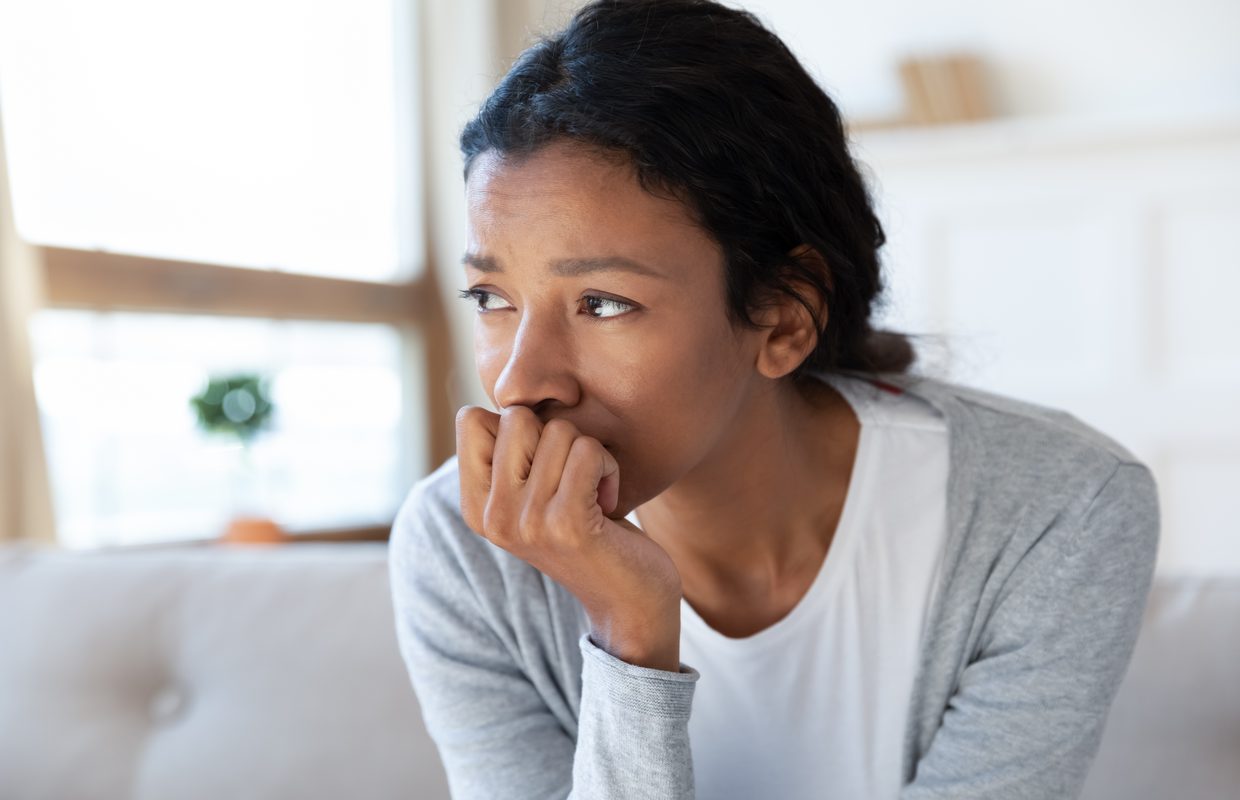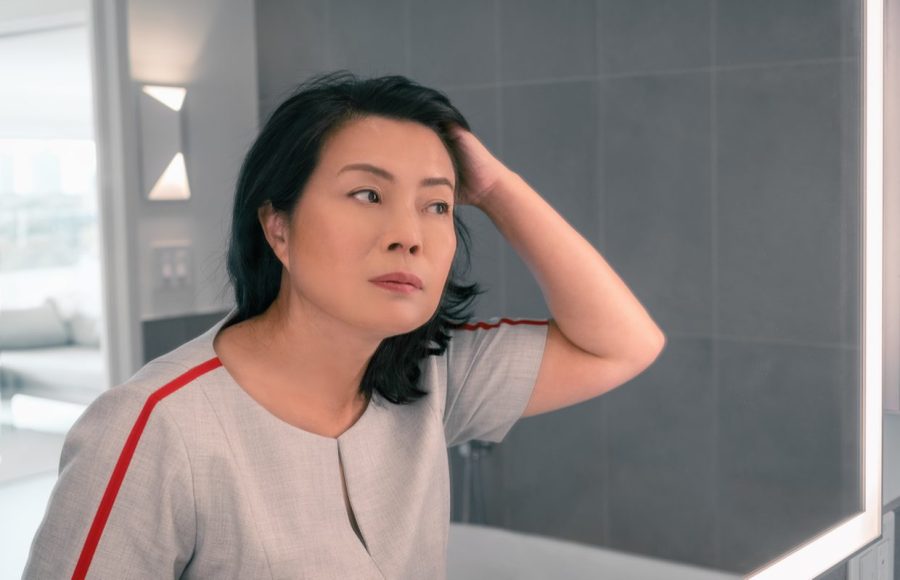An estimated eight million women in the UK suffer from hair loss, much of which is caused by stress. This Stress Awareness Month, learn how to reduce your stress levels and protect your hair for years to come with these top tips and product recommendations…
Words: Sarah Rodrigues | Images: Shutterstock
Regardless of style, length or colour, our hair has always been central to our identity and self-expression. Indeed, so connected with the psyche is hair that it’s often one of the first things to be affected when stress levels rise: texture and volume can diminish and it may even cause hair loss to occur.
Can stress cause hair loss?
Old wives’ tales would have you believe that stress, or a shock, can cause hair to turn white or fall out overnight but that’s not a million miles from the truth. Stress is known to alter the body at a cellular level, which can mean damage to the hair follicle and to hair colour stem cells, causing white hair, while stress also makes your adrenal glands produce cortisol. ‘This pushes the hair follicles out of growth phase and into resting phase, after which they fall out,’ says Bianca Estelle, founder of Vitamin Injections London.
This type of hair loss is called telogen effluvium. Unlike the lost strands of hair you may normally see when washing or brushing, telogen effluvium causes the hair to fall out in large quantities. Stress-related hormonal imbalance can also occur by way of higher than normal levels of testosterone. This can convert to dihydrotestosterone (DHT) which causes the hair follicles to shrink and therefore for the hair to fallout.
In men, this tends to manifest as a receding hairline. In contrast, women are more likely to experience an all-over shedding and thinning. On the other end of the spectrum, too little progesterone can lead to oestrogen dominance. This also triggers excessive shedding.

Stress is known to alter the body at a cellular level, which can mean damage to the hair follicle.
Are we more stressed than ever?
Part of the problem, of course, is that human beings are more stressed than ever before. ‘Modern day stress is a beast more complicated than our bodies were designed to handle,’ says Simone Thomas, leading trichologist and hair-loss expert. ‘Our adrenalin-releasing “fight or flight” system has protected us from harm for centuries. However, today, people are all too frequently in a perpetual state of high stress. This constant stress has physical ramifications, of which hair loss can be one,’ says Simone.
This is due to the high levels of cortisol coursing through your blood, which tells your body that you’re under stress. Hormones aside, stress can also lead to people pulling at their hair, albeit unconsciously. ‘Some people can feel an irresistible urge to pull at their own hair,’ says Bianca. ‘This is called trichotillomania. It may involve hair being pulled from the eyebrows, eyelashes or head – anywhere on the body where hair grows.’
The condition can cause damage to the hair follicles, leading to prolonged or even permanent thinning or loss. Yet another problem that can arise is the body attacking its own immune system. This can affect hair follicles leading to alopecia, also known as alopecia areata.
Could a lack of nutrients be causing your hair loss?
‘Although some is genetic, most of the hair loss we see is brought on by lifestyle,’ she says. ‘Stress is one factor in the cause of hair loss, but this in turn can affect diet and the intake of vitamins or minerals which are essential for healthy hair’. In other words, when you’re stressed, you’re less likely to eat well. Plus, stress can also affect digestion, which compromises your ability to absorb the vitamins contained in your food.’
In addition, it seems that when dishing out the available nutrients, your poor scalp and hair are often last in the queue. ‘Since they’re not vital organs, they don’t get prioritised when it comes to receiving nutrients,’ says Simone. ‘For this reason, they often need extra help. Extra B vitamins, zinc, selenium and magnesium can all benefit hair health enormously.’
Many of the vitamins and minerals that improve hair health are also the ones that help with stress management. So, try incorporating foods rich in these can help to make the anxieties of life more tolerable. B vitamins, found in turkey, meat, brown rice and asparagus and kale, among others, support your nervous system. Alternatively, magnesium, present in dark leafy greens, salmon and tuna, assists in staving off depression and high blood pressure: both adjuncts of stress.

We are seeing a stress epidemic in modern day society. This can cause many physical problems to arise, including hair loss.
How to manage your stress levels and prevent hair loss:
In terms of other lifestyle changes, Bianca suggests the following: ‘Take steps to manage stress levels to prevent hair loss. It doesn’t matter whether this is exercise, yoga, mindfulness, developing good sleep habits, cutting out caffeine and alcohol – or even a mix of all of these. What’s important is that it works for you.
Do scalp massages reduce hair loss?
Scalp massage boosts circulation, promoting a better supply of nutrients to hair follicles, which could prevent or reverse hair loss. It’s also a great opportunity to slow down, relax and show yourself some TLC. Use an oil to massage – try one containing rosemary, which stimulates follicles – while breathing slowly and deeply, thinking positive thoughts about your hair.
5 essential products for combatting stress-induced hair loss
The following will help you bounce back from stress-induced hair loss and get thicker hair – from the inside and the outside!

1. Try hair-boosting vitamin patches
Packed with essential nutrients, the Hair & Nail Patches by Vitamin Injections London (£54.99 for a month) deliver vitamins through your skin to ensure more than 90 percent of the ingredients reach your bloodstream.

2. Boost your collagen
Scientifically proven to boost hair and nails, Skinade (£115.50 for a 30-day supply) delivers collagen in a liquid form to trigger your body’s own collagen production. This, in turn, can help with the regrowth of hair following stress-related hair loss.

3. Create instant volume
Vitamins and lifestyle changes take time to reverse hair loss caused by stress, so for instant results, try the new Revlon One-Step Hair Dryer and Volumiser (£59.99). It combines the power of a dryer with the volume of a styler. Plus, it is designed to reduce heat exposure and minimise damage.

4. Use a hair oil
The Nourishing Hair & Scalp Oil by Isla Apothecary (£20) contains a medley of oils designed to nourish and clarify your scalp. Massaged in, it will boost circulation, carrying essential nutrients to your follicles for healthy, strong, growth and regrowth.

5. Promote healthy hair growth
The new Simone Thomas Hair Care Plan (£60 for a month’s supply), comes in two formulas, one based on biotin and one on ginkgo. Both help improve condition and growth and contain high-grade vitamins, minerals, herbs and antioxidants.







